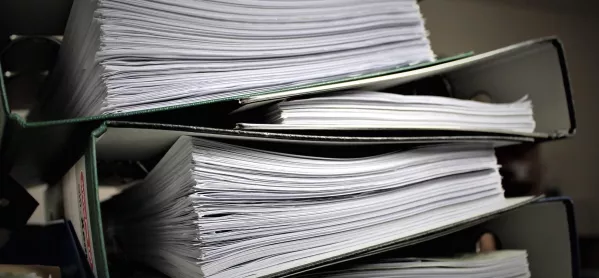The government’s refusal to release vital papers about the academies programme has led to fears it might have “something to hide”.
In the past year, the Department for Education has released two sets of heavily redacted papers from headteacher board (HTB) meetings - which form the basis for decisions about millions of pounds of taxpayers’ money - under freedom of information laws.
But now DfE officials have said that even FoIs will no longer be an avenue to access full sets of HTB documents, after they this month refused a Tes request on the basis of time and cost, and said a previous release was “made in goodwill” to allow narrower requests to be submitted in the future.
Geoff Barton, general secretary of the Association of School and College Leaders, said the department’s decision was “a very surprising response that is likely to feed a lot of thinking that there is something to be hidden”.
The DfE said removing exempt information “would place a considerable burden and a significant strain on the department, in terms of time and resource” because “the exempt information cannot be easily isolated, because it is scattered throughout the requested material”.
But critics said it is the whole approach used by the DfE to hold the meetings and compile the accompanying documents - with no thought for separating exempt material - that makes their release so time-consuming.
Robert Hill, an education consultant and former Downing Street adviser to Tony Blair, called on HTBs to mirror rules the government imposes on councils in the interests of openness and transparency.
He said: “Even if some redaction is required because, for example, there is some reference to the competence of the principal or members of the trust board, it would be perfectly possible to construct a format for HTB meetings that follows the spirit if not the letter of the access to information arrangements that councils have to follow and operate a public Part A and confidential Part B agenda.”
A DfE spokesperson says: “Freedom of information rules are designed to ensure transparency while protecting taxpayers’ money from being wasted on unnecessarily broad requests that would take too long to carry out.
“In this instance the department has provided advice on how to amend the request so it does not waste publicly funded resources and is more likely to be released. Anyone who is unhappy with the response they receive is free to make a complaint and contact the Information Commissioner’s Office.
This is an edited article from the 25 August edition of Tes. Subscribers can read the full article here. This week’s Tes magazine is available in all good newsagents. To download the digital edition, Android users can click here and iOS users can click here
Want to keep up with the latest education news and opinion? Follow Tes on Twitter




